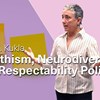pathological
Completed: The effects of psychological structures on values and voting behavior
A study of the differences between the voters of the Sweden Democrats, the Social Democrats and the Moderate Party.
Axiological Retributivism and the Desert Neutrality Paradox
Campbell, T. Axiological Retributivism and the Desert Neutrality Paradox. Philosophies 2022, 7, 80. https://doi.org/10.3390/philosophies7040080 Abstract: According to axiological retributivism, people canan outcome in which someone gets what she deserves, even if it is bad for her, can thereby haveintrinsic positive value. A question seldom asked is how axiological retributivism should deal withcomparisons of outcomes that differ with respect to the number and identities of deserving agents.Attempting to answer this question exposes a problem for axiological retributivism that parallels awell-known problem in population axiology introduced by John Broome. The problem for axiologicalretributivism is that it supports the existence of a range of negative wellbeing levels such that if adeserving person comes into existence at any of these levels, the resulting outcome is neither betternor worse with respect to desert. However, the existence of such a range is inconsistent with a setof very plausible axiological claims. I call this the desert neutrality paradox. After introducing theparadox, I consider several possible responses to it. I suggest that one reasonable response, thoughperhaps not the only one, is to reject axiological retributivism.
Completed: Examining and overcoming the psychological barriers to climate action
This project's highly international and interdisciplinary collaboration will create synergies and develop important means to tackle climate change.
A patch to the possibility part of Gödel’s Ontological Proof
in Analysis, Volume 80, Issue 2 AbstractKurt Gödel’s version of the Ontological Proof derives rather than assumes the crucial (yet controversial) Possibility Claim, that is, the claim that it is possib
Postdoctoral researcher studying the psychological significance of online recommendations
We are looking for a postdoctoral researcher in a project that aims to empirically investigate the psychological impact of online recommendation systems.
Attitudes towards childbearing, population, and the environment: Examining prevalence and demographic and psychological correlates
Stockholm Research Reports in Demography 2024:41 Abstract Environmental concerns may influence personal fertility decisions and general opinions about childbearing and population, but research on this t
Friendship trust and psychological well-being from late adolescence to early adulthood: A structural equation modelling approach
Scandinavian Journal of Public Health, Volume: 45 issue:3, pp.244-252. doi.org/10.1177/1403494816680784 Abstract Aims:This study explored the sex-specific associations between friendship trust and the p: The findings suggest that young people do not benefit from trustful social relations to the same extent as adult populations. Young women who express impaired well-being run a greater risk of being members of networks characterized by low friendship trust over time.

Climate emotions and affective dilemmas. A psychological and philosophical study of their normative principles and the public's perceptions
An interdisciplinary projects that tries to understand the normativization of climate emotions. How "should" we feel about climate change?
Quill R. Kukla: Healthism, Neurodiversity, and Respectability Politics
Venue: Institute for Futures Studies, Holländargatan 13 in Stockholm Research seminar with Quill R. Kukla, Professor of Philosophy and Disability Studies at Georgetown University and fellow at the SOCRAAbstract

Quill Kukla: Healthism, Neurodiversity, and Respectability Politics
“Healthism” is the pervasive ideology according to which each of us is responsible for valuing and protecting our own health and prioritizing health over other values, while society has the right to e








